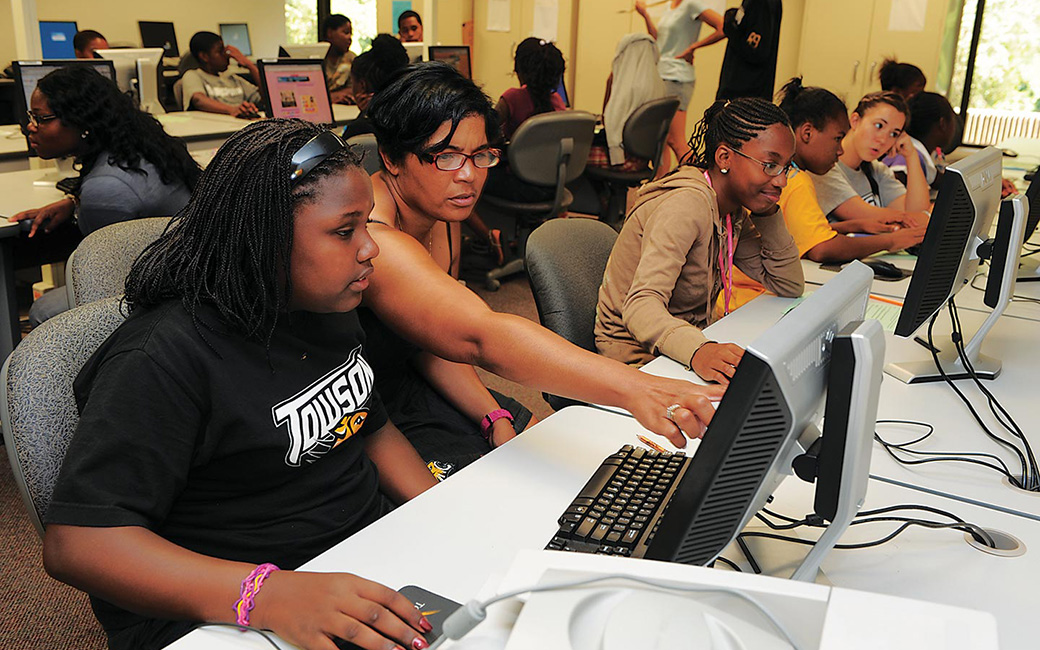TU brings new energy to BTU community partnership program
Towson University's 167 partnerships and relationships with Greater Baltimore communities get a new focus with BTU.
April 26, 2016

It’s positive energy that makes Towson University a leader in innovation, and now that energy is converting into BTU.
No, it’s not British Thermal Units, though Provost Timothy J. L. Chandler jokingly claimed it anyway. BTU is the new name of the outreach and partnership efforts that join TU with organizations in Greater Baltimore to make significant differences in people’s lives.
“BTU will give greater purpose and presence to the work already underway by our faculty, students, and staff,” said President Kim Schatzel at the Towson University Showcase, held in the Minnegan Room of Johnny Unitas Stadium® Tuesday.
BTU is not a new initiative. Rather, says Schatzel, it makes those efforts a new priority for the university, harnessing them into one overarching mission for making a difference in communities. According to the BTU program website, more than 9,000 students have been part of the partnerships that already exist, putting them in Greater Baltimore communities in service-learning, innovation, advocacy and other areas of positive impact, often guided by TU faculty.
Schatzel says the university has 167 partnerships and relationships in Greater Baltimore communities in which the work falls into five kinds of initiatives: high quality and equitable education; strong neighborhoods and sustainable communities; thriving and competitive economy; lifelong health and well-being; and a vibrant arts and cultural community.
“BTU will demonstrate and represent the energy, power, and work of our university through faculty, staff and students, and invests in the Greater Baltimore region through our partnerships with our community and business partners,” Schatzel told the packed room.
These partnerships include a community improvement and anthropological advocacy work between TU and the Sharp-Leadenhall neighborhood of Southwest Baltimore, led for 10 years by Anthropology Professors Matthew Durington and Sam Collins. They also include a relationship with Building Steps, a nonprofit dedicated to helping city students graduate from college; right now, only nine percent of city high school graduates finish college, but the Building Steps program helps 80 percent of its participants earn their degrees.
Additionally, TU’s own Center for Geographic Information Studies (CGIS) has developed a web app to help parents find the closest quality child care to their home or workplace, including interactive design that lets them map out travel routes on the Maryland Transit Administration bus system and even see street-level images of the facilities.
TU has been recognized with a five-year Carnegie Community Engagement classification, which means it meets criteria for meaningful collaboration with the larger community. Roughly 10 percent of the nation’s four-year colleges and universities can claim this distinction.
“This prestigious recognition means that Towson University engages in authentic and mutually beneficial partnerships, assesses the impact of those partnerships as substantial to its university mission, and is committed to aligning other campus priorities to engagement such as community-based learning,” Schatzel told the showcase attendees.
“The faculty and the staff, and the partners here today represent only a small fraction of the really extraordinary and innovative work that’s happening across campus here,” said Chandler. “Team members are living TU’s mission every day by providing opportunities for students, by collaborating across departments and colleges, and obviously connecting with those of you in the community.”
Community organization representatives were invited to today’s showcase, which featured, aside from the BTU announcement, displays and networking opportunities for various TU initiatives. The event was sponsored by the TU Division of Innovation and Applied Research.
HARNESSING ENERGY
BTU
“BTU will demonstrate and represent the energy, power, and work of our university through faculty, staff and students, and invests in the Greater Baltimore region through our partnerships with our community and business partners,” Schatzel told the packed room.